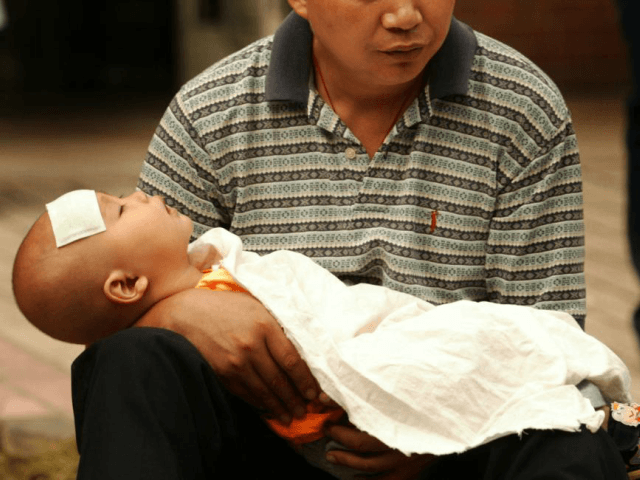Angry parents and teachers demonstrated outside government buildings in Beijing over the past two days, lodging an unusually vigorous public complaint against the communist government for its handling of defective vaccines from one of China’s largest biotech firms.
The protests topped off a week of mounting anger over the Changsheng Biotech scandal, which involved the distribution of some 250,000 substandard vaccinations to children in the province of Shandong. It was not the first scandal to rock Chinese medicine recently. In fact, it was not even the first vaccine scandal in Shandong. The Chinese public clearly reached a breaking point with the latest revelations and is unsatisfied with the arrest of a few corporate executives.
Demonstrators assembled outside the National Health Commission and National State Drug Administration in Beijing to demand more information from the government and more accountability for those who allowed the vaccines to be distributed. Some challenged government assurances that no serious consequences from the defective medicine have been reported, insisting their children got sick after receiving injections.
The scene was very different from the sort of orchestrated government-friendly demonstration normally conducted in China. The demonstrations in Beijing only involved a few dozen people, but observers professed astonishment that they were allowed to take place at all. The New York Times quoted a World Health Organization representative, who suggested the Chinese government’s penchant for secrecy is angering the public and making the story harder for Beijing to control:
The protests on Monday, coupled with an outpouring of anger on social media in recent days, suggested that many parents were having doubts about allowing their children to be injected with vaccines made in China.
Dr. Gauden Galea, the representative of the World Health Organization in China, said the fact that the faulty vaccines had been discovered by investigators for the China Food and Drug Administration showed that the country’s regulatory system was working. But he said the government, which often favors secrecy in investigations, would need to be transparent to restore faith in immunizations.
“They need to ask and answer more questions than the population is asking in order to earn the trust back,” he said.
“It is very rare to see people risk their own freedom and safety to start or join a protest. I think people in China are always afraid of being watched by the police,” Patrick Poole of Amnesty International told CNN on Tuesday.
CNN noted there is also public outrage in China over a faulty heart medicine that was recalled in 22 countries, a significant blow to China’s ambition to increase its global market share for drug sales.
Fitch Ratings warned on Monday that the string of drug safety scandals “highlights the high business risks facing Chinese pharmaceutical companies.”
Fitch expects the Chinese government to tighten drug safety regulations, which will in turn “expose Chinese drug makers to higher regulatory risk,” but the ratings service is not optimistic about China’s ability to resolve its drug safety issues in the near future, so the industry is unlikely to meet the Chinese government’s goals for worldwide sales and investment.
The vaccine debacle also has international repercussions. Canada’s CBC News reported on Sunday that health authorities in British Columbia are urging the parents of children vaccinated in China last year to check their immunization records and make sure the vaccines have not been recalled.
Song Lizhi, director of the immunization program in Shandong, reportedly attempted to kill himself with an overdose of insulin over the weekend and was said to be in critical condition on Tuesday.
A suspicious government-friendly report that Song was merely receiving treatment for diabetes was floated in the Science and Technology Daily but quickly deleted. The disease control center in Shandong claimed he was hospitalized on Sunday to deal with “fatigue and work pressure.” Chinese social media buzzed with rumors Song tried to kill himself to escape prosecution or protect others involved in the vaccine scandal.
The vaccine scandal is dealing a remarkable amount of political damage to President Xi Jinping, until now seen as all-powerful. The New York Times marveled on Tuesday that a professor from Xi’s alma mater Tsinghua University in Beijing actually got away with excoriating Xi in a published essay.
“People nationwide, including the entire bureaucratic elite, feel once more lost in uncertainty about the direction of the country and about their own personal security, and the rising anxiety has spread into a degree of panic throughout society,” law professor Xu Zhangrun wrote last week.
Xu followed this pronouncement by encouraging Chinese lawmakers to restore term limits to the presidency that were abolished in March to make Xi Jinping president-for-life. Incredibly, he is apparently still able to teach, publish, leave his house, and consume solid food after writing that.
Several analysts told the NYT that Xu’s bold criticism is one of several signs that the vaccine scandal is blending with bad economic news and China’s trade dispute with the United States to loosen Xi’s grip on power, especially his hold on the Chinese intellectual elite and upper middle class. Former government officials purged during Xi’s rise to power are passing around Xu’s essay as evidence that resistance to Xi’s agenda is building.
A revolution might be too much to hope for, although Xu’s critique pointed out that the 30th anniversary of Tiananmen Square is approaching and called for a frank reappraisal of the brutal government crackdown. Some analysts see political infighting and government paralysis as more likely results of the vaccine scandal and Xi’s other woes. That would not be a bad consolation prize for U.S. strategic planners.

COMMENTS
Please let us know if you're having issues with commenting.